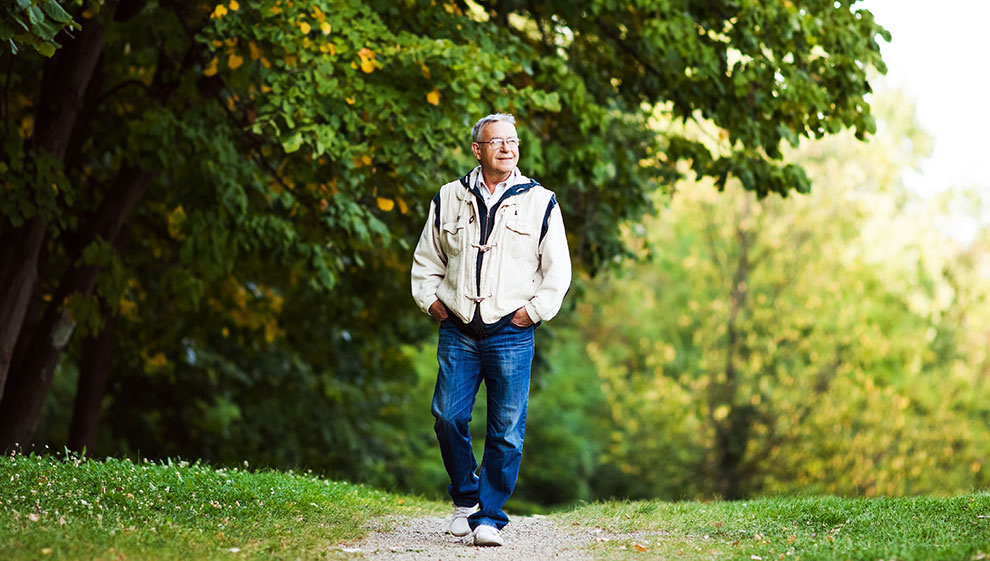5 ways to nurture your mental health with nature
The power of nature is well documented, with many research studies consistently reporting wide ranging benefits for mental and physical wellbeing.
It’s no wonder many of us have reconnected with nature over the past couple of years, finding it the most helpful antidote to the ongoing uncertainty of the pandemic. The Mental Health Foundation revealed that going for a walk was one of the most effective coping strategies, while 45% of people said that being in green spaces was vital to mental wellbeing.
Nature can even help to buffer the effects of loneliness or social isolation – it was found that when people with low social connections also have high levels of nearby nature, they report high levels of wellbeing.
Why is nature so good for us?
There are several interesting theories:
- Biophilia theory: This argues that since our ancestors evolved in wild settings, relying on the environment for survival, we have an innate drive to connect with nature
- Stress reduction theory: This suggests that spending time in nature triggers physiological responses that lower stress levels
- Attention Restoration: This implies that we use a great deal of mental effort to pay attention in busy environments such as offices and cities, and nature offers a break from all this.
The reason that nature nurtures our physical and emotional wellbeing is likely to be due to a combination of all three: we’re wired to love nature, it reduces stress physiologically and it restores attention.
5 ways to nurture your mental health with nature
Here are just some of the many ways you can appreciate the natural world. If you can’t venture outside for any reason, there are also a couple of ways you can cultivate nature’s healing properties indoors.
Get your daily dose of green and blue spaces

Access to green spaces such as parks, fields, gardens and woods has been linked to improved mood and mental functioning, increased life satisfaction, better physical health including lower blood pressure and enhanced immune function, and a reduced risk of mental health problems.
Positive effects on mental health have also been found with exposure to blue spaces, such as rivers, lakes and seas. But how much nature should we be getting? There’s evidence that the most effective dose of nature is 120 minutes a week. That means visiting your local park or a walking along your nearest river for around 20 minutes a day.
Immerse yourself in nature
We can all learn from the Japanese concept of shinrin-yoku, or ‘forest bathing’, which involves immersing yourself in nature in a mindful way, using your senses.
Since the 80s, researchers have been studying the therapeutic effects of forest medicine and have found countless healing benefits. Shinrin-yoku is now a standard practice in Japan for managing stress, depression and anxiety.
So while you’re in your local green or blue space, try to use mindfulness to really absorb the experience, noticing what you can see, hear and smell. Breathe in the fresh air. Maybe you even take your shoes off and feel the grass under your feet.
Bring the outside in
If you’re lucky enough to have a room with a natural view, make the most of sitting by the window and watching the natural world go by. It’s been found that having a view of nature can speed up healing for hospital patients, improve student test scores, and reduce stress and aggressive behaviour.
Why not become a plant parent? Significant mental health benefits were found by having plants in an office, including a 37% reduction in anxiety, a 58% reduction in depression, a 44% decrease in anger, and a 38% reduction in fatigue.
Certain plants can even help to purify the air, as shown in NASA’s 1989 study, and the introduction of plants to one office was linked to a 25% decrease in symptoms of ill health, including fatigue, concentration problems, dry skin and irritation of the nose and eyes.
If you struggle to keep plants alive, don’t fret – it’s been found that looking at pictures of nature is enough to lower stress levels. So simply having natural images in your home can improve your wellbeing. Not only that, but watching nature documentaries can improve your mood.
Create an indoor oasis
It’s not just the sights – the sounds of nature can also have positive effects on wellbeing. It was found that crickets chirping and waves crashing leads to improved performance and increased happiness compared to listening to traffic and the clatter of a busy café.
Natural scents can play a role too. Conifers emit oils and compounds to protect themselves from microbes and pathogens – these ‘phytoncides’ are also good for us, with studies showing that breathing in forest air boosts the functioning of our immune system. Interestingly certain wood ‘essential oils’ are also known to deliver these benefits.
Perhaps consider playing nature sounds in your home, or using wood essential oils – allergy permitting – to add to the outdoor ambience.
The power of pets
There was a staggering rise in pet ownership during the pandemic with research suggesting 3.2 million households in the UK got a new pet since the outbreak of COVID-19. 41% of those who bought a pandemic puppy said the main reason was to have a lockdown companion according to Kennel Club.
Indeed, 90% of people said their pet helped them cope emotionally with lockdown, while 96% said their pet helped keep them fit and active in a study by the University of York.
Previous studies have also shown that people who have pets have healthier hearts, are sick less often, get more exercise, and are less depressed. Pets can also have calming effects – simply stroking, being close to or playing with a pet can reduce distress, heart rate, blood pressure and muscle tension.
Simply petting an animal for 10 minutes was found to be enough to reduce the stress hormone cortisol. And you don’t have to own an animal to reap these stress benefits – Borrow My Doggy reveal that 80% of borrowers say they feel less stressed since joining and spending time with a dog.
If you do have a pet, you can further harness the benefits with our pet mindfulness video.
Think Naturally
There’s a wealth of evidence showing nature has benefits for both physical and psychological wellbeing. We’ve put together a handy worksheet Think Naturally: A guide to re-engage with nature to help you track and reflect on your time spent in the natural world.
Last updated Thursday 23 January 2025
First published on Wednesday 12 May 2021


